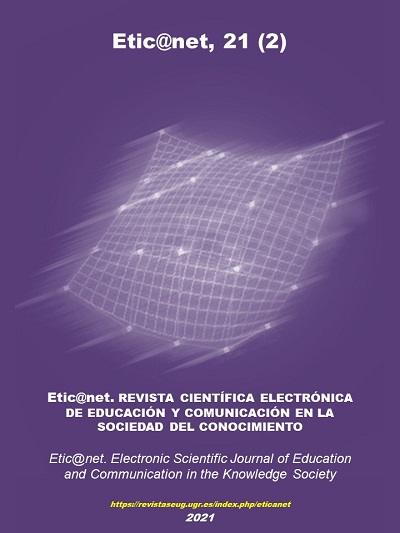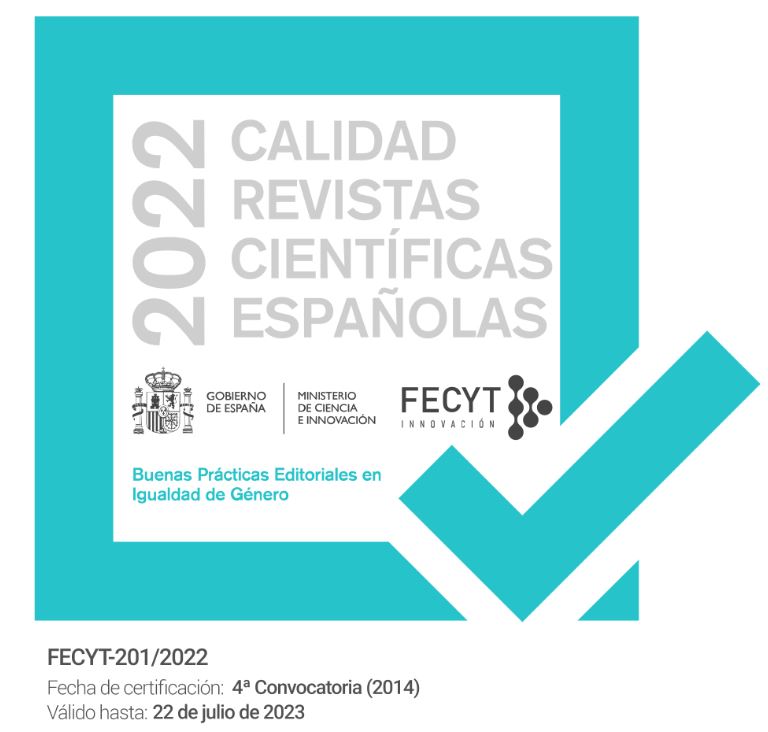ICT in higher education to solvent a health crisis
DOI:
https://doi.org/10.30827/eticanet.v21i2.21780Keywords:
Covid-19, digital divide, virtual education, online education, higher educationAbstract
The article presents the results of an investigation carried out in a Mexican Higher Education Institution, which aims to explain the teaching and learning process carried out from total virtuality, during the period of confinement caused by the Covid disease pandemic. -19, from the opinion of students in the area of computer science. The applied methodology corresponds to the interpretive perspective, guided by the assumptions of the case study in which the in-depth interview, the focus group and the content analysis are used as information gathering techniques; Similarly, the applied analysis techniques revolve around categorical summation, correspondence and models, and naturalistic generalizations. The main findings indicate that, although Information and Communication Technologies have been the support to give continuity to the educational process, through virtual and online education, students state that these modalities have not allowed them to achieve significant learning, taking into account the preparation of homework, virtual classes, understanding the subject, progress and monitoring of their professional training; particularly, of those students who are in vulnerable environments, evidencing the increase of the digital divide in these contexts.
Downloads
References
Alcántara, A. (2020). Educación superior y COVID-19: una perspectiva comparada. En Educación y pandemia, una visión académica. (pp. 75-82). Universidad Nacional Autónoma de México.
Arriagada, P. (2020). Pandemia Covid-19: Educación a Distancia. O las Distancias en la Educación. Revista Internacional de Educación para la Justicia Social, 9 (3), 1-3. https://revistas.uam.es/riejs/article/view/12396/12222
Barrón, M. C. (2020). La educación en línea. Transiciones y disrupciones. En Educación y pandemia, una visión académica. (pp. 66-74). Universidad Nacional Autónoma de México.
Brown, C. & J. Salmi (2020, 20 de mayo), Putting fairness at the heart of higher education. https://www.universityworldnews.com/post.php?story=20200417094523729
Chaet, D., Clearfield, R., Sabin, J.E. et al. Ethical practice in Telehealth and Telemedicine. J GEN INTERN MED 32, 1136–1140 (2017). https://doi.org/10.1007/s11606-017-4082-2
Chehaibar, M. L. (2020). Flexibilidad curricular. Tensiones en tiempos de pandemia. En Educación y pandemia, una visión académica. (pp. 83-91). Universidad Nacional Autónoma de México.
García, H. A. & Beas, L. R. (2020). La enseñanza en los programas académicos y quirúrgicos en tiempos de COVID-19. Revista Mexicana de Urología, 80 (2), 1-3. https://www.revistamexicanadeurologia.org.mx/index.php/rmu/article/view/622/843
García-Peñalvo, F. J., Corell, A., Abella-García, V., & Grande, M. (2020). La evaluación online en la educación superior en tiempos de la COVID-19. Education in the Knowledge Society, 21 (12), 1-26. https://doi.org/10.14201/eks.23013
Goetz, J. & LeCompte, M. (1988). Etnografía y diseño cualitativo en investigación educativa. Ediciones Morata, S.A.
Hodges, C.,Moore, S.,Lockee, B.,Trust, T. & Bond, A. (2020). The difference between emergency remote teaching and online learning. Educause Review. https://bit.ly/3b0Nzx7
Instituto Internacional para la Educación Superior en América Latina y el Caribe (2020, 15 de mayo). El coronavirus-19 y la educación superior: impacto y recomendaciones. http://www.iesalc.unesco.org/2020/04/02/el-coronavirus-covid-19-y-la-educacion-superior-impacto-y-recomendaciones/
Instituto Nacional de Estadística, Geografía e Informática (2018, 9 de mayo de 2020). Encuesta Nacional sobre Disponibilidad y Uso de Tecnologías de la Información en los Hogares (ENDUTIH) 2018. https://www.inegi.org.mx/programas/dutih/2018/
Instituto Nacional de Estadística, Geografía e Informática (2018b, 9 de mayo de 2020). Encuesta Nacional de Ingresos y Gastos de los Hogares (ENIGH). 2018 Nueva serie. https://www.inegi.org.mx/programas/enigh/nc/2018/
Lloyd, M. (2020). Desigualdades educativas y la brecha digital en tiempos de COVID 19. En Educación y pandemia, una visión académica. (pp. 115-121). Universidad Nacional Autónoma de México.
Muñoz, J. L. & LLuch, L. (2020). Educación y Covid-19: Colaboración de las Familias y Tareas Escolares. Revista Internacional de Educación para la Justicia Social, 9 (3), 1-17. https://revistas.uam.es/riejs/article/view/12182/12058
Núñez, J. M. (2020). COVID-19 por SARS-Cov2 también ha afectado a la Educación Médica. Revista Educación Médica, 21 (4), 261-264. https://doi.org/10.1016/j.edumed.2020.06.001
Organización de las Naciones Unidas para la Educación, la Ciencia y la Cultura. (2020, 17 de mayo). Education: From disruption to recovery. https://en.unesco.org/covid19/educationresponse
Ortí, A. (1989). La apertura y el enfoque cualitativo o estructural: la entrevista abierta y la discusión de grupo. En El Análisis de la realidad social (pp. 171-203). Alianza.
Ruíz, E. (2020). Robótica pedagógica móvil y pensamiento computacional. Una propuesta de actividad lúdica. En Educación y pandemia, una visión académica. (pp. 130-137). Universidad Nacional Autónoma de México.
Sánchez, M. & Vega, J. C. (2003). Algunos aspectos teórico-conceptuales sobre el análisis documental y el análisis de información. Revista Ciencias de la Información, 34 (2), 49-60. https://biblat.unam.mx/hevila/Cienciasdelainformacion/2003/vol34/no2/5.pdf
Sánchez, M., Martínez, A. M. P., Torres, R., De Agüero, M., Hernández, A. K., Benavides, M. A., Jaimes, C. A. & Rendón, V. J. (2020). Retos educativos durante la pandemia de COVID-19: una encuesta a profesores de la UNAM. Revista Digital Universitaria, 21 (2), 1-23. https://www.revista.unam.mx/wp-content/uploads/AOP.pdf
Stake, R. (2007). Investigación con estudio de casos. Ediciones Morata, S. L.
Published
Issue
Section
License
The authors who publish in this journal agree to the following terms: The authors retain the copyright and grant the journal the right to be the first publication of the work as well as licensed under a Creative Commons Attribution License that allows others to share the work with an acknowledgment of the authorship of the work and the initial publication in this magazine. Authors are allowed and encouraged to disseminate their work electronically (for example, in institutional repositories or on their own website) before and during the submission process, as it may lead to productive exchanges as well as further citation. Earliest and greatest of published works (See The Effect of Open Access).













